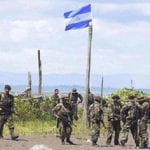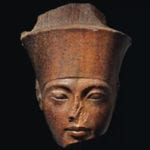 Weird Stuff
Weird Stuff  Weird Stuff
Weird Stuff  Humans
Humans 10 Surprising Ways Game Theory Rules Your Daily Life
 Food
Food 10 Popular (and Weird) Ancient Foods
 Animals
Animals Ten Bizarre Creatures from Beneath the Waves
 Technology
Technology 10 Unexpected Things Scientists Made Using DNA
 Space
Space 10 Surprising Things Found or Left on the Moon
 Humans
Humans 10 Unique Ancient Peoples Whose Cultural Footprints Still Shape the World
 Technology
Technology 10 Inventors Who Died Before Seeing Their Creations Succeed
 Crime
Crime 10 Shocking Crimes Where the Perpetrator Walked Free
 Creepy
Creepy 10 Representations of Death from Myth, Legend, and Folktale
 Weird Stuff
Weird Stuff 10 Days of Humiliation When the Person Should Have Stayed in Bed
 Humans
Humans 10 Surprising Ways Game Theory Rules Your Daily Life
 Food
Food 10 Popular (and Weird) Ancient Foods
Who's Behind Listverse?

Jamie Frater
Head Editor
Jamie founded Listverse due to an insatiable desire to share fascinating, obscure, and bizarre facts. He has been a guest speaker on numerous national radio and television stations and is a five time published author.
More About Us Animals
Animals Ten Bizarre Creatures from Beneath the Waves
 Technology
Technology 10 Unexpected Things Scientists Made Using DNA
 Space
Space 10 Surprising Things Found or Left on the Moon
 Humans
Humans 10 Unique Ancient Peoples Whose Cultural Footprints Still Shape the World
 Technology
Technology 10 Inventors Who Died Before Seeing Their Creations Succeed
 Crime
Crime 10 Shocking Crimes Where the Perpetrator Walked Free
 Creepy
Creepy 10 Representations of Death from Myth, Legend, and Folktale
Top 10 Controversial Territorial Disputes
The world is divided in countless ways, by seas, cultures, languages, religions and wealth. But the most contentious divide is that of the political borders. They can be traced back to the early Egyptian Dynasties and have shaped the history that we know today. As a result of their long history, borders are ever changing and continually disputed. Some disputes end up being peacefully solved, some end in war, and some continue to this day. This list contains 10 controversial land disputes that exist to this day.
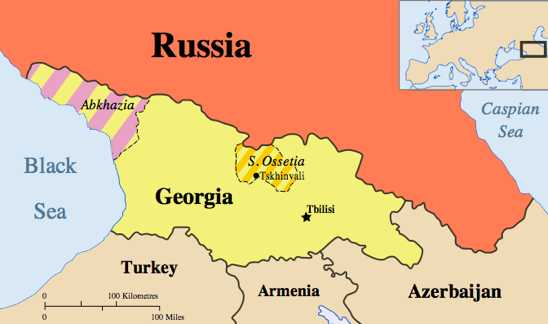
Claims: Georgia vs. Republic of Abkhazia and Republic of South Ossetia
Both Abkhazia and South Ossetia are breakaway republics from Georgia in the Caucasus. The two little known territories have battled for independence from Georgia since the 1920s, but are still unsuccessful in their claims. As a result of the Russian Revolution in 1917, under the Soviet Union, Abkhazia and South Ossetia became part of Georgia as two autonomous republics. However, Abkhazia and South Ossetia declared independence from Soviet Georgia in 1923 and 1922 respectively, after wars in the 1920s. Further troubles started in the early 90s, during the demise of the Soviet Union, when Georgia declared independence from the USSR, and adopted its old constitution. Many believed the old constitution would eliminate the autonomy of the regions, but in fact it didn’t. The troubles eventually led to wars in 1992 and 2008. After the 2008 war, Russia officially recognized the countries as two, separate and individual states, and along with Nicaragua, Venezuela, Nauru and Vanuatu is one of the only countries to officially recognize the states. The UN, EU and NATO, however, refuse to recognize Abkhazia and South Ossetia as sovereign states.

Claims: Republic of Serbia vs. Republic of Kosovo
Here we have another, more famous dispute, regarding land that once belonged to a socialist republic. This time however, it involves the Socialist Federal Republic of Yugoslavia. Yugoslavia has a long and interesting history, but we will be concentrating on the decline of the socialist state in the 1990s. During the demise, 5 new states were formed: Bosnia and Herzegovina, Croatia, Macedonia, Slovenia and FR Yugoslavia. FR Yugoslavia also contained the autonomous region of Kosovo. War broke out in 1998-99 when the “Kosovo Liberation Army” fought for independence against the Federal Republic of Yugoslavia. The UN was very much on the side of the KLA, and helped with the bombing of FR Yugoslavia. After the war, FR Yugoslavia relinquished all claims to Kosovo and accepted it as a UN controlled region. FR Yugoslavia then split into two individual states, Serbia and Montenegro, in 2006. Kosovo then declared independence from Serbia, on 17th February, 2008, with its capital city as Pristina. It is officially recognized by 80 UN member states, plus Taiwan. It is a member of the IMF and World Bank Group; however it is still, technically, a partially recognized state.
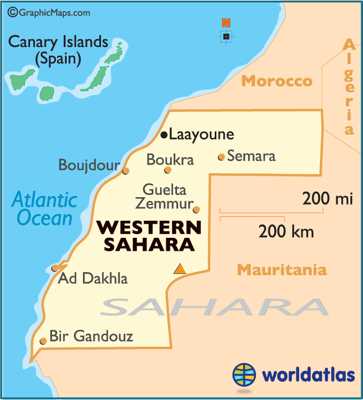
Claims: Kingdom of Morocco vs. Sahrawi Arab Democratic Republic
We now move from Europe to the disputed African territory of the Western Sahara, bordered by Morocco, Algeria and Mauritania. It is one of the most sparsely populated territories in the world, mainly consisting of desert flatlands. The population is estimated at just over 500,000 – many of whom live in one city. According to the UN, it is a non-decolonized territory on the “List of Non-Self-Governing Territories”. Originally belonging to the Spanish Empire, it is now claimed by both Morocco and the Sahrawi Arab Democratic Republic, after the Madrid Accords, in 1975, when Spain agreed to end its presence in the area. The SADR controls 20-25% of the territory, with Morocco controlling the rest. 58 states officially recognize the SADR as the government of the Western Sahara, 22 have withdrawn their recognition and 12 have frozen it pending a UN referendum. The Arab league is the main and only support for Morocco’s claim to the territory. The SADR joined the African Union in 1984, leading to the withdrawal of Morocco, making them the only African Nation not in the union. To this day, the UN doesn’t recognize the West Sahara as a sovereign state ruled by the SADR.
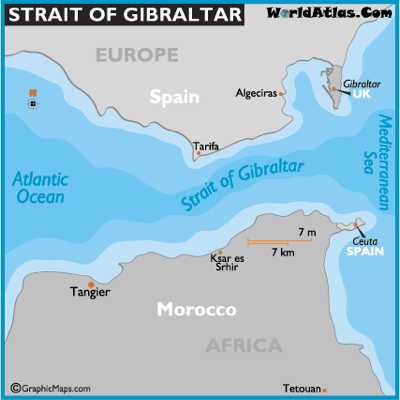
Claims: Kingdom of Spain vs. United Kingdom of Great Britain and Northern Ireland
The territory of Gibraltar has been fought over for years, due to its ideal position on the Gibraltar strait. The strait provides access to the Mediterranean and the Suez, and is of major importance for international shipping and trade. Military control of the strait currently lies jointly with the UK and Morocco, as opposed to Spain, even though Spain has significant military bases near the Strait. This decision was made by NATO and is thought to be because of the special relationship between the US and UK, and the status of Gibraltar as a “British Overseas Territory”. An Anglo-Dutch force originally captured Gibraltar in 1704, during the War of the Spanish Succession. The territory subsequently ceded to Britain by Spain forever under the Treaty of Utrecht in 1713. Since the territory was handed over, the Spanish have tried three times to recapture the town through sieges, but none were successful. It now holds a claim to the territory, although it still remains British. Referendums were held, in 1967 and 2002, to return Gibraltar to Spain, but 99% of the population voted to remain a British Territory on both occasions. No great tensions lie between Spain and the UK over the joint claim, but nonetheless, it still remains an interesting political situation as Spain shows no signs of relinquishing the claim.
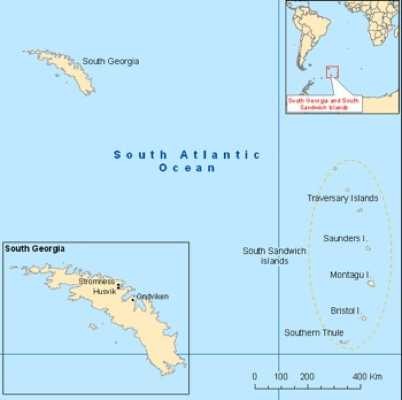
Claims: Argentine Republic vs. United Kingdom of Great Britain and Northern Ireland
Closely linked to the Falkland Islands (see below), these islands have also been the focus of the rift between Argentina and the United Kingdom since the pioneers sailed to the area in the 18th century. The United Kingdom claimed sovereignty over South Georgia in 1775, after a voyage by James Cook, and the South Sandwich Islands, in 1908. In 1908, the United Kingdom annexed both South Georgia and the South Sandwich Islands. The Argentine claim originated when an Argentine-registered whaling company set up operations on South Georgia, in 1904. In 1906, the company signed a lease with the Falkland Islands government, and, following the 1908 annexation, the company started to use British whaling licenses and started looking to the South Sandwich Islands for expansion. Following the Argentine claims, the UK repeatedly (in 1947, 1951, 1953 and 1954) offered to take the matter to the International Court of Justice in The Hague, but this was turned down by Argentina. The islands briefly came under Argentinian control during the 1982 Falklands War, but were returned to UK control after the war. In 1985, South Georgia and the South Sandwich Islands ceased to be Falkland Islands dependencies and became a separate British overseas territory. Argentina continues to claim sovereignty over South Georgia and the South Sandwich Islands, to this day, the most recent development coming in 2010 when the Venezuelan President, Hugo Chavez, called on Queen Elizabeth II to give the Falklands and South Georgia to Argentina.

Claims: Central Tibetan Administration vs. Peoples Republic of China
The sovereignty of Tibet is a controversial and complex situation, which calls for those involved to look as far back as the 13th century Yuan Dynasty. The People’s Republic of China’s view is that Tibet has been an indivisible part of China, by law, since the Yuan Dynasty. Ancient maps also support this claim, as do many other countries, therefore Tibet is widely accepted as an autonomous region of China. The USA, UK, EU and France publicly accept Tibet as a part of China, along with many other countries. However, the UK only recently clarified its position saying: “Like every other EU member state, and the United States, we regard Tibet as part of the People’s Republic of China”. Until this announcement, the UK was the only country not to recognize China’s control of Tibet. The confusion results from the Chinese Invasion of Tibet in 1950, when the new communist government started the “Liberation of all Chinese territories”. Before the Invasion, the Government of Tibet had ruled the area, even though it was considered a Chinese territory, but after the war, the PRC incorporated Tibet into China with a 17 point agreement with the Dalai Lama. This agreement made Tibet an autonomous region under Chinese control. However, it is said that the Tibetan delegates were forced into signing the agreement (surrender under duress). The world, however, was reluctant to help Tibet as it was widely believed that Tibet and China would find a peaceful solution, with the help of India. Since the war, there have been many attempts to rebel against the PRC, but to no avail. Even with funding from the CIA, the resistance movement failed to retake control of Tibet. The Central Tibetan Administration remains in exile in India, ruled by the Dalai Lama, and there is no sign of Tibet gaining independence.
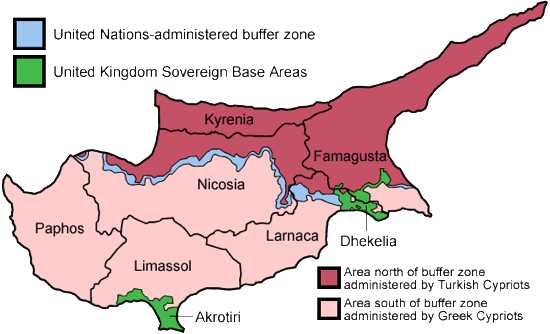
Claims: Republic of Cyprus vs. Turkish Republic of Northern Cyprus
For centuries there have been political issues and wars between Greece and Turkey, and this dispute is no different. The Ottoman Turks seized the island of Cyprus in 1571, but allowed the Greek culture to remain. The island was then leased to the UK in 1878, which then officially annexed Cyprus when the Ottoman Empire entered WWI on the German side. The 1923 treaty of Lausanne finally terminated any Turkish claims to the island. Tensions were high on the island as both Greek and Turkish Cypriots lived in close proximity. As a result, the British held onto the island longer than any of its other colonies, to try and keep the peace. In 1954, a Greek Cypriot resistance group, the EOKA, was set up to try to unify Cyprus with Greece. They launched attacks on the British and the Turks whilst fighting for independence. This resulted in a Turkish resistance group forming, leading to battles across the island. The British held onto the island until 1960, when the Republic of Cyprus declared independence. Even so, fighting between the Greek and Turkish Cypriots remained a daily occurrence, so much so that the UK, Greece and Turkey called for a NATO force to be sent in to keep the peace.
In 1974, the new Greek military Junta backed a coup organized by the EOKA from the Greek mainland to overthrow the current leader, Makarios, and take control of the island. They were successful and Makarios only survived after escaping the island on a British fighter jet. Turkey launched an air and sea invasion of the island in July, in response to the Greek led coup. Turkey claimed their intervention was justified under Article 2 of the Treaty of Guarantee, which calls on Greece, Turkey and Britain to ensure the independence of the island. By August of 1974, the government set up by the coup had collapsed, along with the Greek Military Junta. Makarios retook control of Cyprus, and the old Greek government re-took control of Greece. The Turks had captured the northern most 37% of the Island and set up the de facto state of the Turkish Republic of Northern Cyprus. As a result of the partition, NATO sent a peacekeeping force into a buffer zone to control the situation, but to this day peace has not been restored. Only Turkey recognizes the Turkish Republic of Northern Cyprus as a state, and there are no signs of reunifying the island.
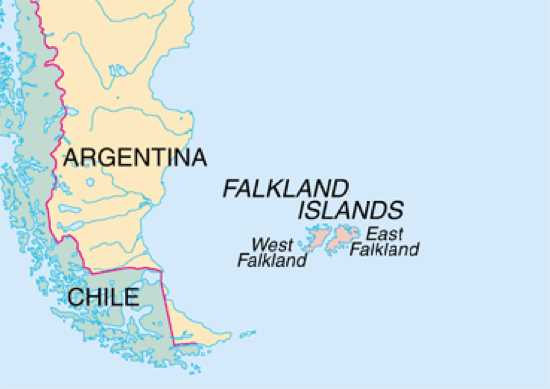
Claims: Argentine Republic vs. United Kingdom of Great Britain and Northern Ireland
Very closely linked to South Georgia, but of greater importance, the Falklands Islands have been the main cause of debate between the United Kingdom and Argentina. The British claim to sovereignty dates from 1690, and the United Kingdom has exercised de facto sovereignty over the island almost constantly since 1833. Argentina has long disputed this claim, having been in control of the islands for a brief period prior to 1833. The island had originally belonged to France, and control changed continuously between Spain, Britain and Argentina (United Provinces and the Federation) up to 1833, when the United Kingdom claimed sovereignty and ordered the Argentinians to leave. The islands then remained under British control until 1982, when Argentina invaded the islands (along with South Georgia, above) and started the Falklands War.
Argentinian desire to control the islands first arose after WWII, during the decline of the British colonies. They raised the sovereignty issue with the UN, which advised the two nations to negotiate peacefully with each other – they did for 17 years, until 1981. Relations were positive during this period, with oil being supplied to the island by the Argentinians, and a runway built at Stanley by the British for the Argentinian airlines to use. However, negotiations on the sovereignty were at a stalemate as the islanders were determined to remain a British colony. A war was narrowly avoided in 1977, when oil supplies were cut off to the airport at Stanley; however, war did, unsurprisingly, begin in 1982. Argentina was in the midst of a devastating economic crisis and large-scale civil unrest against the repressive military junta that was governing the country. So on April 2nd, a combined Argentine amphibious force invaded the Islands. The UK immediately assembled a task force to re-take the islands supported by the majority of the world. The US led the UN resolutions that condemned Argentina and secretly provided the UK with the latest missiles. France gave valuable information about the French built jets used by the Argentine air force, and trained RAF pilots to fight them. New Zealand sent ships to relieve the Royal Navy of duties in the Indian Ocean so they could head for the Falkland’s and Chile provided early warning radar messages about incoming attacks. Many other countries supported the UK, so much so that Columbia was the only real support Argentina had. The last islands were recaptured on 20th June, and the war was over. It was a small war with big international involvement; Admiral Woodward famously said “It was a damned close-run thing”. The islands remain under British control, but Argentina shows no sign of relinquishing its claim.
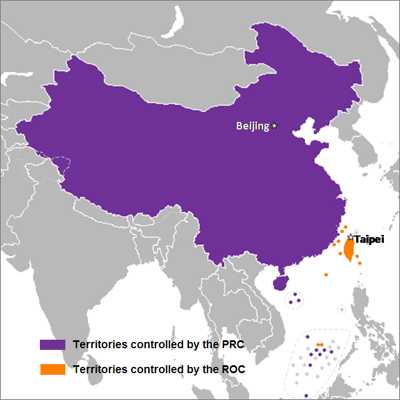
Claims: Peoples Republic of China vs. Republic of China (Taiwan)
The two countries share similar names, but the Republic of China (commonly referred to as Taiwan) declares independence from the People’s Republic of China. Unlike Tibet however, Taiwan has some international support with its independence claim. Many suggest the ROC should be re-named the Republic of Taiwan, to cut links to China and push for complete international recognition. To put the complex history simply, pre-WWII, Taiwan belonged to Japan, and the Republic of China was the collective name for mainland China. Then, after WWII, Taiwan was surrendered to the ROC by Japan, but because of the civil war on mainland China between the communist People’s Republic of China and the ROC, it was unclear to whom Taiwan belonged. The PRC took control of mainland China, but the island of Taiwan kept the name the Republic of China, as a separate state, declaring independence from the PRC. The USA is one of the main allies of Taiwan, providing them with aircraft and arms and recognizing them as a separate state from the PRC. The People’s Republic of China claims that the ROC government is illegitimate and refuses to acknowledge its call for independence. However, The ROC – with its own constitution, independently elected president, and large army – views itself as an independent sovereign state. The PRC refuses to have diplomatic relations with any nation that recognizes the ROC. As a result, there are only 23 states that have official diplomatic relations with the ROC. In practice, most countries view the ROC as an independent state and, as such, maintain unofficial relations with it. Taiwan remains, to this day, a partially recognized state, although unofficial relations exist with most countries, largely due to the PRC’s refusal to have relations with any state who officially accepts Taiwan.
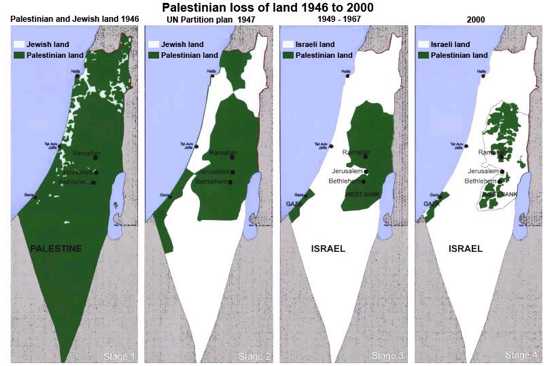
Claims: State of Palestine vs. State of Israel
After reading the list title, I’m sure everyone would have guessed the Palestinian-Israeli conflict would be number 1. It is, by far, the dispute with the most history, thousands of years of it in fact, and the most interesting to study. It is actually what inspired me to write this list. Without wanting to cause too much of an argument, the dispute is religion based. The Jews and the Arabs have fought for generations over the land of Palestine, and each believes they have a right to live there. But we are not going to go into that, for obvious reasons. To write about the entire history of the conflict would take up a whole list in itself, and to even try to suggest “who was there first” would take too much explaining, so for that I recommend the “10 Ages of Palestine” list here on Listverse. Forgetting who was there first, the modern conflict began after WWII and the genocide committed on the Jews by the Nazis. When the camps were liberated, thousands of Jews needed a place to live and, naturally, they flocked en mass to Palestine, where some Jews were already living, but with a mainly Arab population. The British mandate of Palestine fought with the Jews to restore peace to the region, and try to find a solution that would enable the two religions to live in harmony. However, the mandate failed and withdrew in 1947. The UN intervened to restore peace with the 1947 Partition Plan, which called for the creation of two separate states – one Arab and one Jewish. Jerusalem would become an international, UN controlled, city, belonging to neither state. The Jews accepted the plan, but the Arabs refused to agree. On May 14, 1948, the Jews proclaimed independence, creating the state of Israel. The following day, the armies of Egypt, Syria, Lebanon and Iran attacked Israel, launching the 1948 Arab–Israeli War. After a year of fighting, a ceasefire was declared and temporary borders were established. Jordan annexed what became known as the West Bank and East Jerusalem, and Egypt took control of the Gaza Strip.
Further troubles arose in 1956, during the Suez Crisis; when, with the help of France and Britain, Israel invaded the Sinai Peninsula. The UN ordered them to retreat and they did (again too much happened to go into detail). By 1966, Arab-Israeli relations had deteriorated, eventually leading to the Six Day war, in 1967. (Even more happened here, I may just do another list about Arab-Israeli conflicts). After the war, Israel had successfully captured the Sinai Peninsula and Gaza strip from Egypt, West Bank and East Jerusalem from Jordan, and the Golan Heights from Syria. Six years later, the Yom Kippur war broke out and relations remained bad until the 90s. The State of Palestine was declared by the Palestine Liberation Organization in 1988, but they didn’t exercise any control over the Palestine territories. Since then, the PLO has campaigned for recognition of the state, using the 1967 borders. Currently the Arab League and large majorities of South America, African and Asian countries recognize the Palestinian State. Unsurprisingly, European and North American states have not yet recognized Palestine. The UN has planned to vote some time in 2011 on the status of the State of Palestine… we’ll just have to wait and see.
Notable Mentions: North Korea vs. South Korea, Divide of the Antarctic Territories, Israeli Occupied Territories (Golan Heights, West Bank, East Jerusalem, briefly mentioned in number 1), Isthmus between Gibraltar and Spain, Rockall (small rock claimed by 4 states), Dokdo – small island under dispute by South Korea and Japan.
